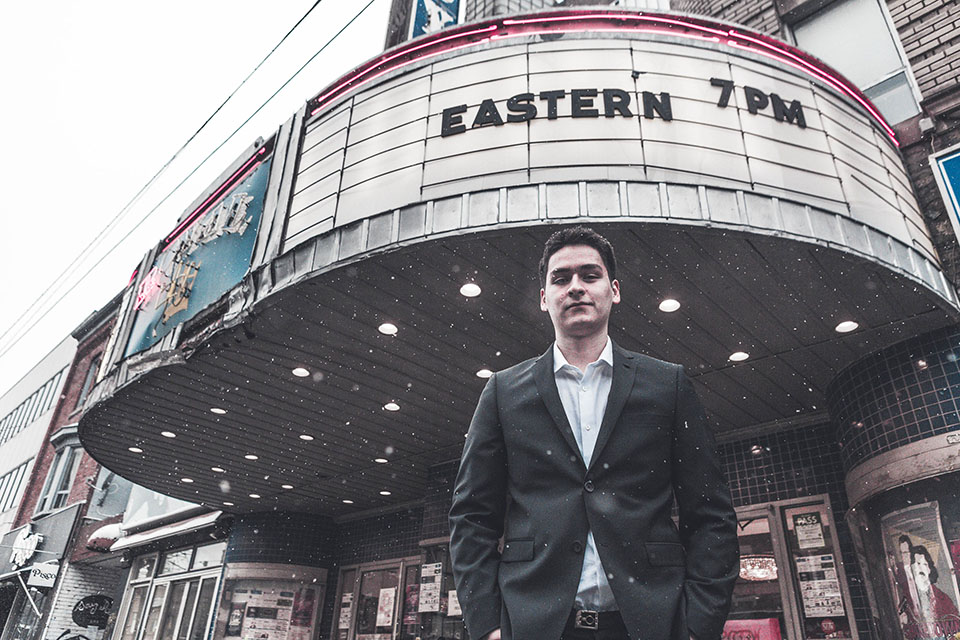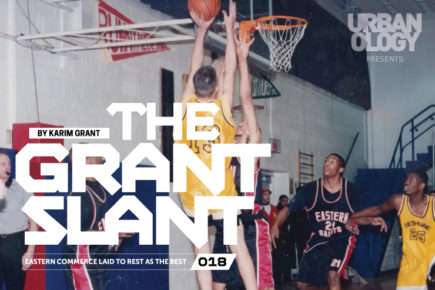By definition, the word gentrification describes the process of renewing and rebuilding by infusing the affluent, or middle-class, into a deteriorating urban area, thereby displacing its own residents. Such is the case of Toronto’s Regent Park, where, since 2005 residents have been slowly ushered out of their dwellings to make way for the “New Toronto” order, like Tory Lanez would say.
That process of gentrification has affected one of the most important high school basketball programs in the city at Eastern Commerce C.I. For a very long time, the school was the beneficiary of talented ball players from Regent, so much so that it was nicknamed the “Regent School”. With Eastern Commerce’s subsequent demise, the process of ‘urban renewal’ seems to have been complete, but Eastern has in fact left a storied legacy that one Luke Galati has endeavoured to put to film.
Galati, a 20-year-old student at the Ryerson University School of Journalism in downtown Toronto and former competitive basketball player, directed the film with the intention of shedding light on the historical significance of what he calls the “catalyst” of modern-day Canadian basketball popularity.
Under his direction, he effectively portrayed the emotional departure of a long-tenured program that helped to navigate the lives of lots of inner-city youth, many primarily from the area of Regent Park, but also many more who claimed various ’hoods throughout the Greater Toronto Area (GTA).
Regent back in the day
Fresh off of my second year of high school, I was lucky enough to benefit from a government-funded program geared towards getting many youth, such as myself, employment for the summer. Luckily, I was able to secure a position with Toronto Parks and Recreation in a neighbourhood called Regent Park.
During that summer, with the guidance of my uncle, then an area coordinator for South Regent, I navigated my way through what would eventually guide some of my professional decisions — decisions that dictate the very nature of my life. Regent Park was home to some of the highest levels of crime and poverty at the time, and I was completely oblivious, or perhaps simply didn’t care. I was making money helping engage neighbourhood kids in playground activities.
Eastern’s prowess on the basketball court reverberated throughout the ball communities of the GTA …
As the weeks progressed that summer, it became evident that I was among the ‘have-nots’ of the city. A street named Gerrard separated The Park (as Regent Park is affectionately known) from the ‘haves’ living in the upscale area of Riverdale. Their million dollar homes sat literally steps away from Sumach Street and its low-rise, poverty-stricken, publicly-funded apartments and townhomes. Most of the area kids usually attended schools in the area, such as Jarvis Collegiate, Eastdale Collegiate, or if you were more athletically inclined, Eastern Commerce was the direction you headed.
Eastern Commerce was a part of an urban folklore that existed long before I began my tumultuous love affair with the game of basketball. Eastern’s prowess on the basketball court reverberated throughout the ball communities of the GTA, escalating mainstream interest into an already hockey-crazy region on the cusp of gaining its own NBA franchise.
Capturing a legacy through film
On an irregularly blustery and snowy spring evening in Toronto, I cursed my way through slippery highways and snow-covered sidewalks to see a screening of the documentary Eastern in Toronto’s Little Italy. A quaint, refurbished movie theatre on College Street housed alumni, friends and supporters of the high school, who gathered to pay homage and demonstrate a keen interest for a documentary depicting the final year of Eastern Commerce’s existence.

Due to a dwindling inner city population in Toronto and an ever-decreasing student populace in schools, the Toronto District School Board decided it would be in its best interest to close the doors of Eastern Commerce once and for all in 2015.
Having helped coach a number of the players who appear in the film, my interest was definitely sparked from the outset, and remained until the final take.
The inevitability of the demise of the program lingered like a dark cloud throughout the film, with viewers hoping for a miraculous ending where the dreams of these kids from Regent Park, Blake Strip, Queen Strip, Jane and Finch and the rest of the GTA would somehow be able to pull off the unthinkable and win the provincial championship, thereby forcing the hand of the board to keep the school open. However, not every tale ends like our childhood storybooks.
I only hope that generations of newly-passioned basketball players will recognize and revere the greatness that was Eastern Commerce …
About six years ago, I was fortunate enough to help coach and take the junior basketball team at Eastern to North Preston, Nova Scotia for an exchange program sponsored by the YMCA. It is safe to say, that upon arrival to the east coast, Eastern’s reputation preceded it, as the players’ opponents were well-informed of their prowess. The town basically shut down to accommodate the squad, just out of mere respect.
That respect is something that the film Eastern exhibits, showcasing how youth from all over the GTA found themselves attending the quaint little school on Phin Avenue just off the Danforth to play this game called basketball at the highest level, in hopes of securing an NCAA Division 1 scholarship, or at the very least one to a Canadian university.
In a nutshell, Eastern Commerce instilled hope; it was where young people from neighbourhoods across Toronto brought to life the second half of the Notorious B.I.G.’s famous line, “Either you slingin’ crack rock, or you got a wicked jump shot.”
My respect for Eastern preceded the film, and was extended thereafter. I only hope that generations of newly-passioned basketball players will recognize and revere the greatness that was Eastern Commerce, and hold in high regard the legacy that it left.
Photos supplied by filmmaker.




1 Comment
For anyone interested in seeing Eastern, it’ll be screened at TIFF Bell Lightbox in Toronto on May 21st, 2016 at 6:30 p.m. It may be our last screening in the city – on behalf of the Eastern documentary team, I hope to see you there! Info and tickets can be purchased through the following link: http://www.sportfilmfestival.ca/eastern-far-from-home/